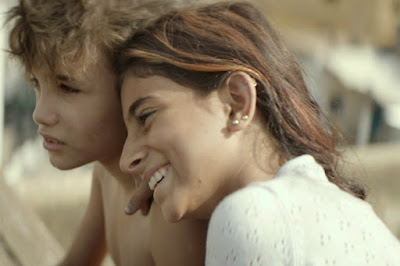Clint Eastwood’s latest film RICHARD JEWELL depicts the bombing at Centennial Park during the 1996 Olympics in Atlanta, Georgia and proceeds to expose how justice was perverted by the media and the FBI. The film is timely in that it plays into Trump rallies’ paranoid depiction of “fake news” and a “corrupt” FBI. The derisive language of today - even the term "quid-pro-quo" is neatly shoe-horned into the script. In one of the early moments on the screen, there is a poster hanging in a lawyer’s office stating: I Fear Government more than I Fear Terrorism. The poster is faintly seen in the background functioning like a subliminal ad, but the words screamed out at me giving an ideological clue to Eastwood’s RICHARD JEWELL. Yes - there was injustice done to the main character, Richard Jewell who had to endure a trial by the press as we have seen myriad times historically - particularly with the Central Park Five Jogger Case where innocence was sacrificed to the altar of political ambition and hate. The Atlanta Journal-Constitution threatened to sue over the portrayal of their newspaper and journalist Kathy Scruggs, unless a disclaimer was put into the film; their request was rejected by Warner Brothers Pictures. This controversy continues.
Richard Jewell (an excellent performance by newcomer Paul Walter Hauser) is a young man living at home with his mother (Kathy Bates) who has become obsessed with “law and order” and desperately wants to be a police officer. We find out more about his zealousness in the pursuit of that goal as the movie progresses. He eventually becomes a Security Guard during the Atlanta Olympics and discovers a suspicious package under a bench and calls it in to authorities thereby saving many lives once the pipe bomb explodes. At first, Jewell, who rarely receives accolades - quite the contrary - he has often been derided and mocked for his physical appearance revels in the attention. This time he has made his mother proud. But soon the FBI becomes suspicious- feeling that he fits the profile of a savior/perpetrator and they begin to build a case against an innocent man using “dirty tricks.”
Jewell needs a lawyer and he chooses a man we have met earlier in the film - a feisty, libertarian, go-it-alone Watson Bryant played by the great under-recognized actor, Sam Rockwell. This character and his voice, I believe is quintessential Eastwood - a man fighting the good fight for the ineffective underdog, a role he has played in movies which has osmotically permeated his being. Bryant’s job is to pull the veil of adoration from Jewell’s eyes and open them up to the reality of injustice so that he will defend himself.
Eastwood’s film is about the manipulation of the justice system by powerful government agents and the press; where any means justifies the proscribed end; familiar to many people who have been caught in a Kafkaesque web. It is a nightmare that leaves one helpless. My problem with Eastwood’s movie is that there is a thin line between advocating for personal freedom and tainting with a broad brush institutions that protect those very freedoms specifically the press. The portrayal of Atlanta Journal-Constitution newspaper reporter Kathy Scruggs (Olivia Wilde) and the methods she uses to procure classified information from an FBI agent (Jon Hamm) made me literally groan with disbelief and annoyance; Eastwood debases her journalistic skills in favor of a cliched image of a beautiful, sexy bitch with no morals whose story detonates lives. In the process, he degrades the “free press” in a way that catapults us into the “fake news” Trump era. It is frightening.


































